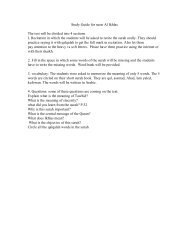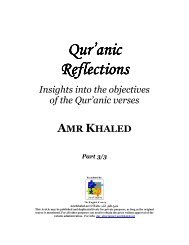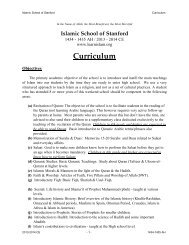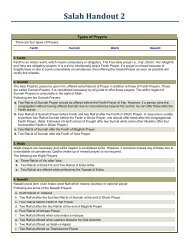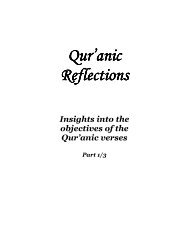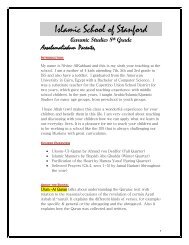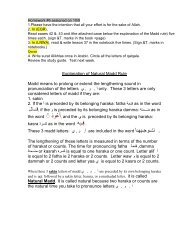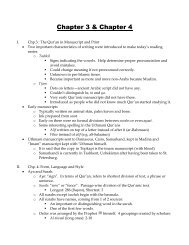Quranic Reflections - Islamic School of Stanford
Quranic Reflections - Islamic School of Stanford
Quranic Reflections - Islamic School of Stanford
Create successful ePaper yourself
Turn your PDF publications into a flip-book with our unique Google optimized e-Paper software.
Surat Al-Kahf (The Cave)<br />
Surat Al-Kahf is a Makkan Surah. It was revealed after Surat Al-Ghaashiyah, but in<br />
the order <strong>of</strong> the Qur’an it comes after Surat Al-Isra’. It consists <strong>of</strong> 110 ayahs.<br />
Threads for One Fabric<br />
Surat Al-Kahf consists <strong>of</strong> four stories: The story <strong>of</strong> the people <strong>of</strong> the cave; that <strong>of</strong> the<br />
man with the two gardens; that <strong>of</strong> Prophet Musa (AS) (Moses) and Al-Khidr; and that<br />
<strong>of</strong> Dhul Qarnain. Several ayahs follow each story for further comment. Thus some<br />
questions are to be raised : What do these stories then have in common Why is the<br />
Surah named Surat Al-Kahf Why should it be read every Friday<br />
The Advantages and Rewards for whoever reads Surat Al-Kahf<br />
The Prophet (SAWS) said, “He who reads Surat Al-Kahf on Friday, Allah will light<br />
for him radiance that stretches from his feet to the holy Ka’ba.” 4 .<br />
The Prophet (SAWS) also said, “…and he who reads the last ten ayahs <strong>of</strong> Surat Al-<br />
Kahf, Al-Dajjal will not be able to harm him.” 5 .<br />
And in another Hadith, “…whoever among you encounters him – Al-Dajjal – should<br />
read upon him the opening ayahs <strong>of</strong> Surat Al-Kahf.” 6 .<br />
What is Al-Dajjal’s relationship with Surat Al-Kahf and what do the stories within the<br />
Surah have in common Let’s then have a brief survey <strong>of</strong> the four above mentioned<br />
stories.<br />
The cave <strong>of</strong> mercy<br />
The first story talks about young men who believed in Allah (SWT) and called to Him<br />
despite the fact that the tribe they lived in was ruled by an unjust king who did not<br />
believe in Allah SWT). The young men presented their religion (surrender to Allah as<br />
an only One Lord) to their people, but the the latter rejected them. Allah (SWT) says<br />
what can be translated as, “And We made their hearts firm and strong (with the<br />
light <strong>of</strong> Faith in Allah and bestowed upon them patience to bear the separation<br />
<strong>of</strong> their kith and kin and dwellings) when they stood up and said: “Our Lord is<br />
the Lord <strong>of</strong> the heavens and the earth, never shall we call upon any iIlah (god)<br />
other than Him; if we did, we should indeed have uttered an enormity in<br />
disbelief. These our people have taken for worship illah (gods) other than Him<br />
(Allah). Why do they not bring for them a clear authority And who does more<br />
wrong than he who invents a lie against Allah... but no one knows its true<br />
meanings except Allah” (TMQ, 18:14-15).<br />
The young men began to call people to Allah (SWT), but they were denied and<br />
oppressed. Thus, Allah (SWT) inspired them to seek refuge in the Cave. Allah (SWT)<br />
4 Sahih Al-Game’: 6471.<br />
5 Sahih Al-Targhib: 225.<br />
6 Muslim: 2937.



